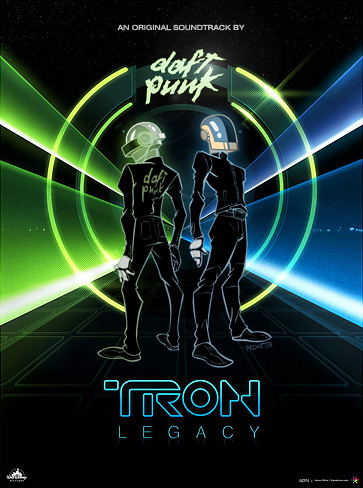 When watching a film it is easy to become so absorbed by what we are seeing that we take what we are hearing for granted. A film's score, or sometimes lack of one, is crucial to how we respond to a film. It is very often the score that tells us how we're suppose to react to what we are seeing.
When watching a film it is easy to become so absorbed by what we are seeing that we take what we are hearing for granted. A film's score, or sometimes lack of one, is crucial to how we respond to a film. It is very often the score that tells us how we're suppose to react to what we are seeing.I was reminded of this fact when I recently got a hold of the “TRON: Legacy” score. Listening to it separate from the film it became all the more clear how crucial it was to the film's success.
The film's music is by French electronic duo Daft Punk, a fitting choice given the first film's synthesizer-based score by Wendy Carlos. Fans of the band expecting a 90-minute techno jam are going to be let down. Daft Punk has done something far more interesting.
There are moments of the fevered electronic beats you'd expect from the band behind thumping dance tracks such as “One More Time” and “Harder, Better, Faster, Stronger,” but what is unexpected is how orchestrally based the soundtrack is. The score is in turns dark, moody, thrilling, melancholy, moving and elegant. Simply put, it is awesome.
Traditionally, film scores have emulated classical music and have been created by composers trained in that style. Perhaps the best example of this is John Williams who has created some of the most memorable and thrilling scores in film history including “Star Wars,” “Jaws,” “Indiana Jones,” “E.T.” and “Harry Potter.”
In the late 1970s into the 1980s, the use of synthesizers and digital effects in film scoring became popular. This trend was most effective in horror movies where creepy soundscapes were created. John Carpenter's sparse, but relentless score for “Halloween” is a good example of this.
Wendy Carlos created all sorts of strange atmosphere for her scores for Stanley Kubrick's “A Clockwork Orange” and “The Shining.” The scores for George Romero's “Dawn of the Dead” and “Day of the Dead” were also heavy on synthesizers and were so effective in creating a menacing mood that the were later sampled by the group Gorillaz.
Electronic-based scores also made a good fit for action films, most notably the work of Harold Faltermeyer, who did memorable, if now somewhat dated, scores for such films as “Beverly Hills Cop” and “Fletch.”
Daft Punk's score for “TRON: Legacy” blends the orchestral and electronic traditions with striking results. Moments of pulsating dance beats are combined with soaring string arrangements and blaring horns in a way that is seamless and often brilliant.
In places Daft Punk even throw in the digital bleeps and bloops of 1980s video games, but this score doesn't feel like a nostalgic throwback. Everything is smoothly integrated.
Daft Punk wasn't the only band this year to venture into composing for film. Trent Reznor of the band Nine Inch Nails did the score for “The Social Network.”
Nine Inch Nails, like Daft Punk, deals in electronic music, but is on the opposite side of the spectrum. Whereas Daft Punk deals in danceable, sunny pop, Nine Inch Nails is heavy, dark and menacing. Reznor brought that vibe to his score for “The Social Network” and in the process gave the origin story of Facebook a sinister edge and amps up the tension of seemingly mundane activities.
It is a good score that works brilliantly with director David Fincher's vision and the razor sharp wit of Aaron Sorkin's script. Even so Daft Punk's achievement feels more significant in terms of personal growth. Reznor's score sounds like Reznor's music, albeit channeled and focused to a new purpose.
Daft Punk's score, on the other hand, is an expansion and departure from what the group is known for, and yet at the same time doesn't squash the band's distinct personality. The score feels new, fresh and like something even more rare: a step forward.

No comments:
Post a Comment